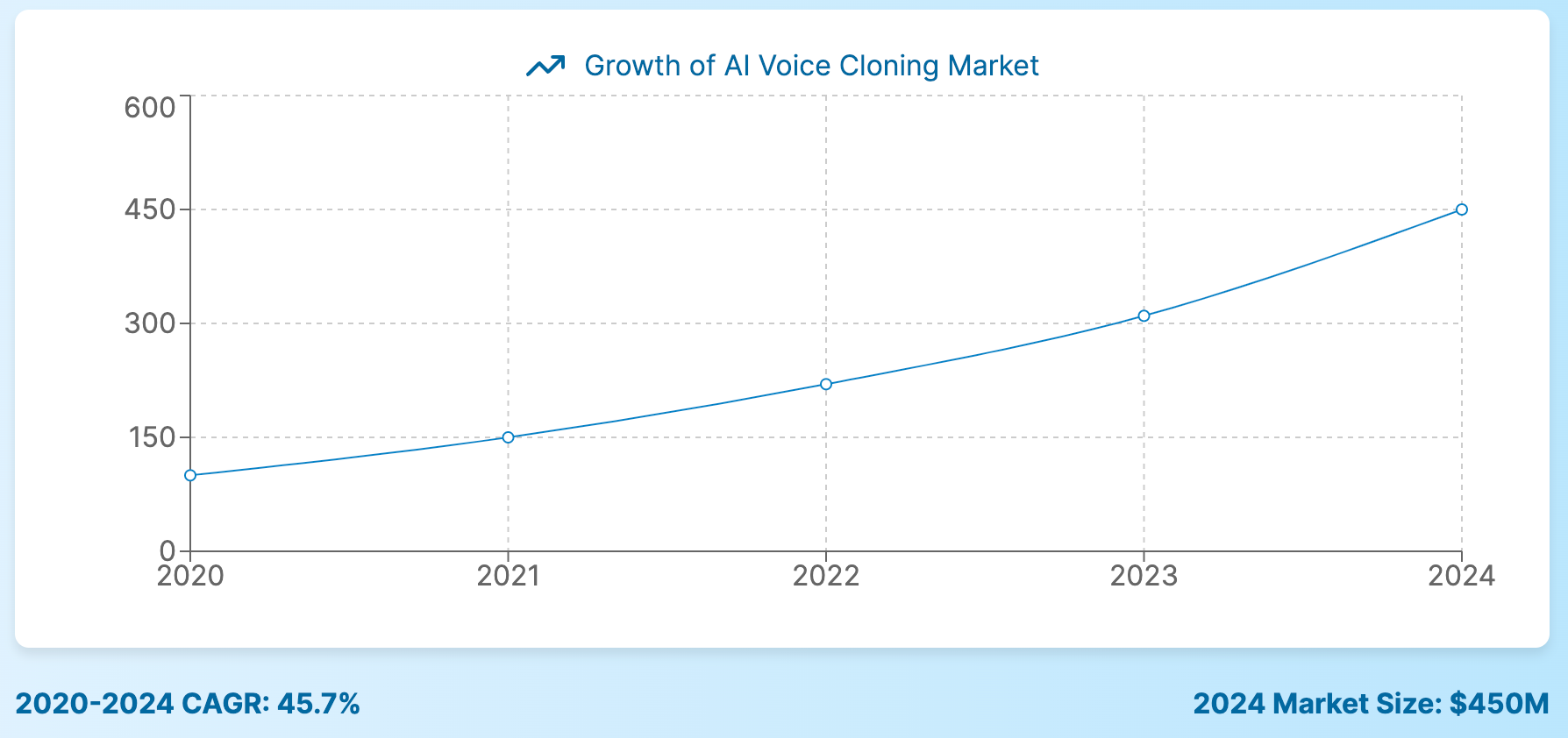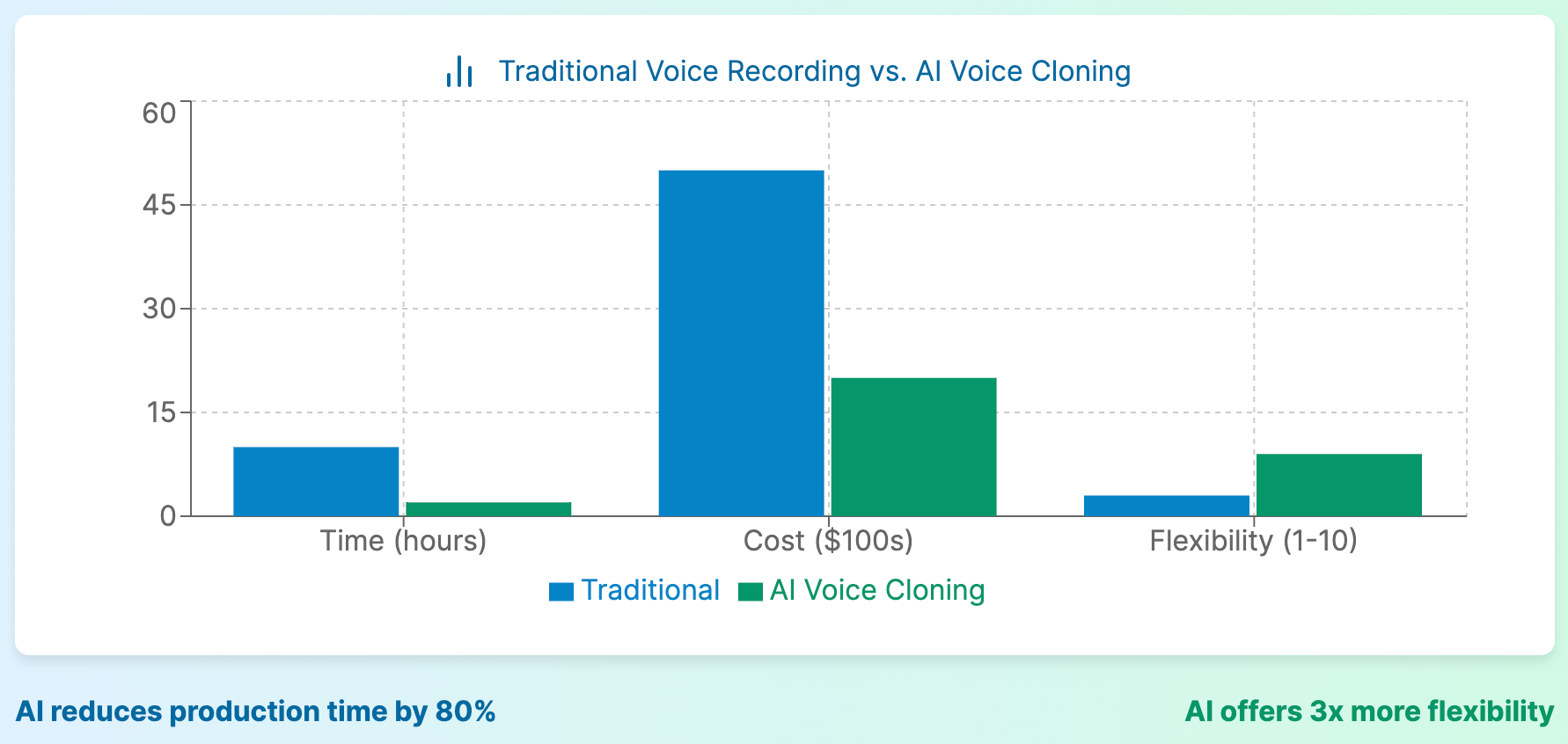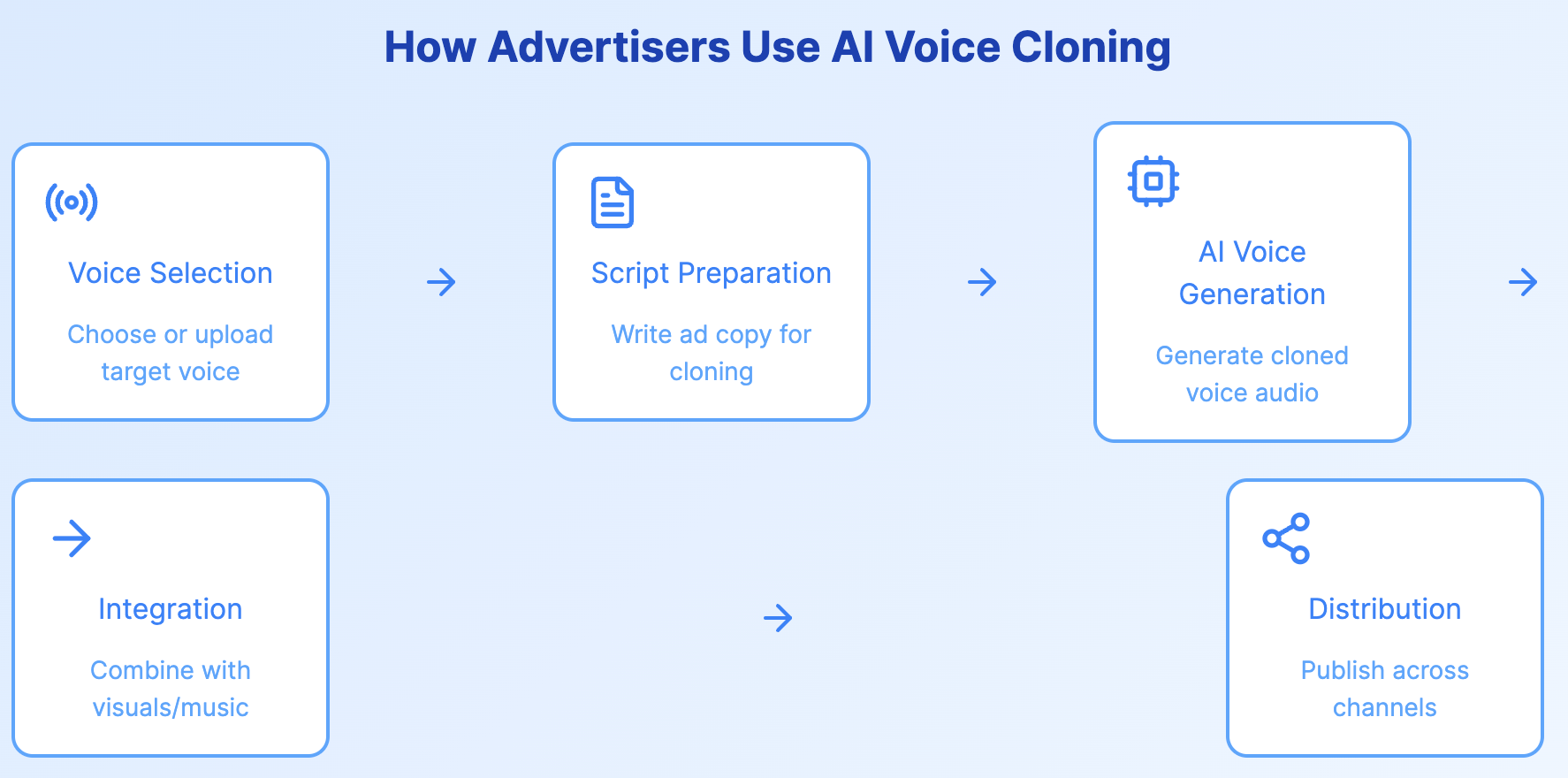AI voice cloning, also known as AI voice replication, is a cutting-edge technology that utilizes artificial intelligence to create synthetic voices that mimic human speech patterns. By analyzing and replicating a person's voice, AI algorithms can generate a digital model of their vocal characteristics, which can then be used for various applications.
The Science Behind AI Voice Replication
At its core, voice cloning relies on advanced machine learning algorithms and natural language processing techniques. These systems analyze vast amounts of audio data to identify and reproduce the nuances of human speech, including intonation, accent, and emotional inflections.
The process typically involves the following steps:
- Data collection: Recording samples of the target's own voice
- Audio analysis: Breaking down the voice into its component parts
- Model creation: Developing a digital representation of the voice
- Voice synthesis: Generating new speech based on the created model
This AI technology has rapidly evolved, with state-of-the-art voice cloning systems now capable of producing highly realistic and natural-sounding synthetic voices.

The Benefits and Applications of AI Voice Cloning
As AI voice cloning technology continues to advance, its potential applications across various industries are expanding. Let's explore some of the key benefits and use cases:
Personalization and Customization in Marketing and Advertising
One of the most significant advantages of AI voice cloning is its ability to create personalized content at scale. In the advertising and marketing realm, this technology enables businesses to:
- Generate custom voiceovers for targeted ad campaigns
- Create multilingual content to reach global audiences
- Develop interactive voice experiences for brand engagement
By leveraging AI-generated voices, companies can craft more relatable and engaging ad creatives that resonate with their target audience. Advertisers can simply select a cloned voice that matches their brand's tone and speaking style to create compelling audio for video ads.
Enhancing Accessibility and Inclusivity
AI voice cloning has the potential to break down communication barriers and improve accessibility:
- Assisting individuals with speech impairments by providing a natural-sounding synthetic voice
- Creating audiobooks and educational materials in multiple languages
- Developing assistive technologies for people with visual impairments
These applications demonstrate how AI voice cloning can contribute to a more inclusive society by making information and services more accessible to diverse populations.
Revolutionizing Entertainment and Media Production
The entertainment industry has been quick to adopt AI voice cloning, using it to create realistic vocal performances for animated characters, dub films and TV shows into multiple languages, and restore or recreate voices for historical figures in documentaries.
This technology not only streamlines production processes but also opens up new creative possibilities for content creators. Voice actors can now license their cloned voices for multiple projects, potentially increasing their earning potential while saving time for production companies.
Addressing Concerns and Misconceptions
Despite its potential benefits, AI voice cloning has raised some concerns and misconceptions. Let's address some of these issues:
Myth: AI Voice Cloning Will Replace Human Voice Actors
Reality: While AI voice cloning is a powerful tool, it is not intended to replace human voice actors. Instead, it complements their work by:
- Providing additional options for content creators
- Enabling voice actors to license their voices for multiple projects
- Streamlining processes for repetitive voice work
The recent agreement between SAG-AFTRA and various AI companies demonstrates how AI voice cloning can be integrated ethically into the entertainment industry, ensuring fair compensation and control for voice actors.
Concern: Privacy and Security Risks
As with any technology involving personal data, privacy and security are paramount. Reputable AI voice cloning platforms implement robust measures to protect user information:
- Encryption of voice data during storage and transmission
- Strict access controls and authentication processes
- Compliance with data protection regulations like GDPR and CCPA
Users should always verify the security practices of any voice cloning service before sharing their voice data.
Ethical Considerations in AI Voice Replication
The ethical use of AI voice cloning is an ongoing discussion in the tech and entertainment industries. Key considerations include:
- Obtaining explicit consent from individuals before replicating their voice
- Establishing clear guidelines for the use of synthetic voices
- Implementing safeguards against potential misuse or fraud, particularly to protect creative content from being exploited
As the technology evolves, it’s crucial to continue developing ethical frameworks and best practices to ensure responsible use of voice clones.
The Future of AI Voice Cloning Technology
As we look to the future, AI voice cloning is poised for continued growth and innovation. Some emerging trends and potential applications include:
- Integration with virtual and augmented reality experiences
- Advanced personalization in customer service interactions
- Development of more emotionally intelligent synthetic voices
These advancements will likely bring new opportunities and challenges, requiring ongoing collaboration between technologists, ethicists, and policymakers.

AI Voice Cloning in Advertising: A Game-Changer for Brands
The advertising industry has been quick to recognize the potential of AI voice cloning technology. By leveraging cloned voices, brands can create more engaging and personalized ad creatives that resonate with their target audience. Here are some ways AI voice cloning is transforming advertising:
- Personalized Video Ads: Advertisers can use voice cloning to create customized video ads that speak directly to individual consumers, enhancing engagement and conversion rates.
- Multilingual Campaigns: With AI voice cloning, brands can easily create ads in multiple languages using the same voice, ensuring consistent messaging across global markets.
- Voice-Activated Ads: As voice-controlled devices become more prevalent, AI-cloned voices can be used to create interactive, conversational ads that respond to user queries in real-time.
- Improved A/B Testing: Advertisers can quickly generate multiple versions of audio ads using different voice clones, allowing for more efficient testing and optimization of ad performance.
- Cost-Effective Production: By using AI-generated voices, brands can save money on hiring voice actors for every new ad campaign, especially for smaller businesses with limited budgets.

Generative AI in Advertising: Beyond Voice Cloning
While AI voice cloning is making waves in the advertising world, it's just one aspect of the broader generative AI revolution in marketing. Here are some other ways brands are leveraging generative AI to create compelling ad creatives:
- Image Generation: AI tools can create unique, brand-specific images for use in display ads, social media posts, and other marketing materials.
- Dynamic Ad Copy: Generative AI can produce personalized ad headlines and body text based on user data and preferences.
- Video Creation: Some AI platforms can generate entire video ads from scratch, combining AI-generated visuals with cloned voices.
- Music Composition: AI can create original background music for ads, tailored to match the brand's tone and target audience.
- Predictive Analytics: Generative AI models can analyze vast amounts of data to predict which ad creatives are likely to perform best for specific audience segments.

FAQ: Common Questions About AI Voice Cloning
Can AI replicate someone's voice?
Yes, AI voice cloning technology can create highly accurate replications of a person's voice. By analyzing audio samples of the target voice, AI algorithms can generate a synthetic voice that mimics the original speaker’s tone, accent, and speaking style.
What is the best AI voice cloner?
There are several reputable AI voice cloning platforms available, each with its own strengths. Some popular options include Resemble AI, Descript, and Respeecher. The best choice depends on your specific needs, budget, and the quality of voice replication required.
Are AI voice changers legal?
The legality of AI voice changers and cloning technology depends on how they are used. Using AI to create a voice clone with the original speaker's consent for legitimate purposes is generally legal. However, using cloned voices without permission or for fraudulent activities is illegal in many jurisdictions.
How does AI recreate voices?
AI recreates voices through a process called deep learning. The system analyzes large amounts of audio data from the target voice, breaking it down into its component parts (phonemes, pitch, rhythm, etc.). It then uses this information to build a model that can generate new speech in the same voice.
Is there an AI to create ads?
Yes, there are several AI tools available for creating ads. These range from platforms that generate ad copy and images to more comprehensive solutions that can create entire video ads using AI-generated visuals and cloned voices.
What is the best free AI ad creator?
While many AI ad creation tools are paid services, some platforms offer free or freemium options. Canva, for example, has AI-powered features for creating social media ads and other marketing materials. However, for more advanced AI ad creation, including voice cloning, paid services typically offer better quality and more features.
What brands are using generative AI in advertising?
Many major brands are experimenting with generative AI in their advertising efforts. Companies like Coca-Cola, Lexus, and Heinz have all used AI-generated content in recent campaigns. Additionally, tech giants like Google and Facebook are integrating AI tools into their advertising platforms to help businesses create more effective ads.
Does AI marketing actually work?
AI marketing, including the use of generative AI and voice cloning, has shown promising results for many businesses. It can improve ad personalization, increase efficiency in content creation, and help optimize ad performance. However, like any marketing tool, its effectiveness depends on how well it's implemented and how it fits into the overall marketing strategy.
Is it possible to clone a voice?
Yes, it is possible to clone a voice using AI technology. Modern voice cloning systems can create highly realistic synthetic voices that are often indistinguishable from the original speaker.
Is AI voice cloning legal?
The legality of AI voice cloning depends on its use and the jurisdiction. When used with proper consent and for legitimate purposes, it is generally legal. However, using cloned voices without permission or for fraudulent activities is illegal in many places.
What is the best AI tool for voice cloning?
The best AI tool for voice cloning depends on your specific needs and budget. Some popular options include Resemble AI, Descript, and Respeecher. Each platform has its own strengths and features, so it's worth comparing them based on your requirements.
Can voice cloning be detected?
While high-quality voice clones can be very convincing, there are methods to detect AI-generated voices. Researchers are continually developing more sophisticated detection techniques to identify synthetic speech.
What is the voice actor AI contract?
The voice actor AI contract refers to agreements between voice actors and companies using AI voice cloning technology. These contracts typically outline how the actor's voice can be used, compensation terms, and rights regarding the cloned voice.
What actors are suing over AI?
Several actors and voice artists have raised concerns or filed lawsuits over the unauthorized use of their voices or likenesses by AI systems. While specific cases may vary, these legal actions generally focus on issues of consent, compensation, and control over one's digital likeness.
Is AI voice copyright free?
AI-generated voices are not automatically copyright-free. The legal status of AI-generated content, including voices, is still evolving. Generally, if an AI voice is based on a real person's voice, there may be copyright or personality rights issues to consider. It's always best to use AI voices from reputable sources that have clear licensing terms.
Embracing the Future of Voice Technology
As AI voice cloning continues to evolve, it's clear that this technology has the potential to transform various aspects of our lives. From enhancing accessibility to revolutionizing content creation and advertising, the applications are vast and exciting. However, it's crucial to approach this technology with a balanced perspective, addressing concerns and establishing ethical guidelines to ensure its responsible use.
By staying informed about the latest developments in AI voice cloning and engaging in open discussions about its implications, we can harness the power of this technology to create a more inclusive, creative, and innovative future. Whether you're a marketer looking to create more engaging ad creatives, a content creator seeking to expand your production capabilities, or simply curious about the future of AI technology, voice cloning is undoubtedly a field worth watching.
As we move forward, it will be fascinating to see how AI voice cloning integrates with other emerging technologies like augmented reality and generative AI to create even more immersive and personalized experiences. The possibilities are truly limitless, and we're only just beginning to scratch the surface of what's possible with this remarkable technology.




